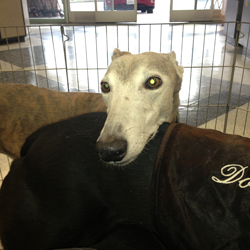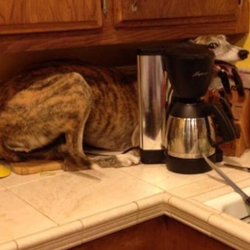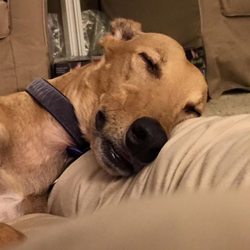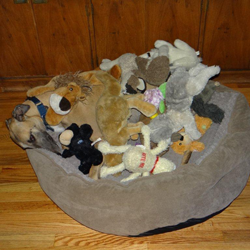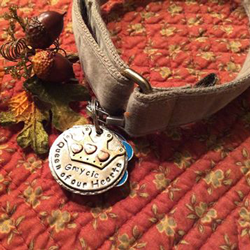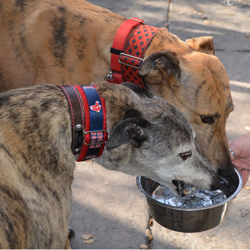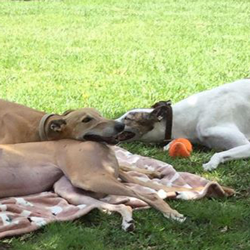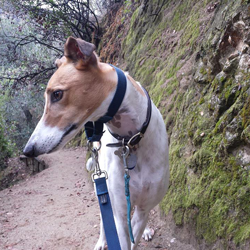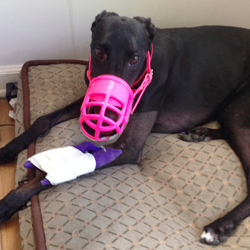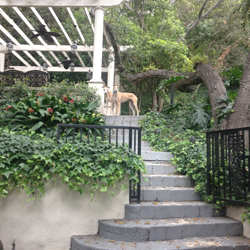GREYHOUND CARE: NAIL TRIMMING AND HEALTH
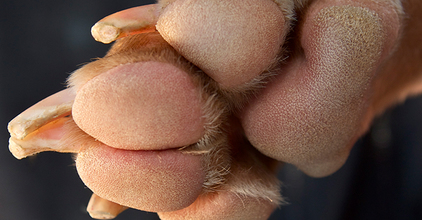
The most common reasons for avoiding nail trims are that the owner is afraid of “quicking” the dog, or that the dog fusses and creates bad feelings around the procedure. Nail cutting becomes an event surrounded by angst and drama. For very active dogs who run all day long on varied surfaces, cutting nails may not be necessary. High mileage wears them down naturally. But among city or suburban dogs who are lucky to get a mile or two walk daily, excessively long toenails are more common than not.
Consequences Of Long Toenails
So what’s the big deal? The first consequence of long toenails is painful feet. When a dog’s toenails contact hard ground, like a sidewalk or your kitchen floor, the hard surface pushes the nail back up into the nail bed. This either puts pressure on all the toe joints or forces the toe to twist to the side. Either way, those toes become very sore, even arthritic. When the slightest touch is painful to your dog, he will fuss when you pick up his paw to cut nails.
The second consequence of long toenails is more serious. All animals rely on information from nerves in their feet to move through the world and process gravity accurately. For millions of years, wild dogs have run long distances while hunting and worn their nails short. The only time their toenails would touch the ground was when climbing a hill. So a dog’s brain is evolutionarily programmed to associate toenail contact with being on a hill, and he shifts his body posture accordingly: leaning forward over his forelimbs, up the imaginary hill as reported by his toes. Since the hill is not real, a secondary compensation with his hind limbs is necessary to avoid a face plant. This abnormal compensatory posture can be called “goat on a rock,” because it brings his paws closer together under his body.
Normal neutral posture is a nice show dog “stack,” with vertical legs like a table. Recent research shows that standing with limbs “camped-in” is hard work to maintain. These goat-on-a-rock dogs get over-used muscles and eventually over-used joints, especially in their hind limbs, making it difficult to jump in cars, climb stairs and even hard to get up from lying down. Sounds like a lot of older dogs we know! Cutting toenails short can be like a miracle cure for your dog whose hind end has become painful, weak and over-used.
That’s the “why.” Now for the “what and how.”
How To Trim The Toenail
Toe nail maintenance requires a trim every two weeks, just like maintaining human fingernails. If you can hear nails clicking on your kitchen floor, they are much too long. But don’t despair, the technique shown here will make short work
of getting your dog’s nails back to their correct shape. The concept is easy: trim around, never across the quick, which is actually your dog’s finger.
Consequences Of Long Toenails
So what’s the big deal? The first consequence of long toenails is painful feet. When a dog’s toenails contact hard ground, like a sidewalk or your kitchen floor, the hard surface pushes the nail back up into the nail bed. This either puts pressure on all the toe joints or forces the toe to twist to the side. Either way, those toes become very sore, even arthritic. When the slightest touch is painful to your dog, he will fuss when you pick up his paw to cut nails.
The second consequence of long toenails is more serious. All animals rely on information from nerves in their feet to move through the world and process gravity accurately. For millions of years, wild dogs have run long distances while hunting and worn their nails short. The only time their toenails would touch the ground was when climbing a hill. So a dog’s brain is evolutionarily programmed to associate toenail contact with being on a hill, and he shifts his body posture accordingly: leaning forward over his forelimbs, up the imaginary hill as reported by his toes. Since the hill is not real, a secondary compensation with his hind limbs is necessary to avoid a face plant. This abnormal compensatory posture can be called “goat on a rock,” because it brings his paws closer together under his body.
Normal neutral posture is a nice show dog “stack,” with vertical legs like a table. Recent research shows that standing with limbs “camped-in” is hard work to maintain. These goat-on-a-rock dogs get over-used muscles and eventually over-used joints, especially in their hind limbs, making it difficult to jump in cars, climb stairs and even hard to get up from lying down. Sounds like a lot of older dogs we know! Cutting toenails short can be like a miracle cure for your dog whose hind end has become painful, weak and over-used.
That’s the “why.” Now for the “what and how.”
How To Trim The Toenail
Toe nail maintenance requires a trim every two weeks, just like maintaining human fingernails. If you can hear nails clicking on your kitchen floor, they are much too long. But don’t despair, the technique shown here will make short work
of getting your dog’s nails back to their correct shape. The concept is easy: trim around, never across the quick, which is actually your dog’s finger.
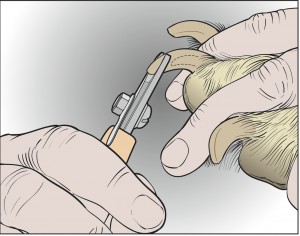
Tools Of The Trade
NAIL CLIPPERS
IF YOU CUT THE QUICK
TIPS AND TRICKS
Once the insensitive nail is thinned out and isn’t supporting the quick, the quick will dry up and recede. This will allow you to cut your dog’s nails even shorter. Each dog’s nails are different, but very long toenails often become dry and cracked, with a clear separation of the living tissue and the insensitive nail. This will make it easier to trim back longer nails.
NAIL CLIPPERS
- Use only “scissor” type clippers. Guillotine style clippers crush the toe, which is painful. Never put the whole nail in a clipper.
- Use small size clippers for better control. Only giant breed dogs will need large ones.
- Keep your tools sharp: either replace or sharpen your clippers regularly.
- “Quick-guards” obscure your view of the nail. If possible, remove them, or at least tape them back so that they won’t interfere with your work.
- “Pedi-paws” type grinder: Smooth out your trim afterwards with a rotating emery board.
- File only the insensitive nail around the top and sides of the quick: “Sharpen the pencil” where the nail is the wood and the quick is the lead.
IF YOU CUT THE QUICK
- Use corn starch to staunch the bleeding if you make a nail leak. With shallow cuts, this will be rare.
- It’s easiest if you use a small container with tightly packed powder.
TIPS AND TRICKS
- Trim nails outside or in a well lit room.
- If you need “cheaters” for reading, use them for toenail clipping too.
- It’s actually easier to see the nail structures on pigmented nails than on white ones. The insensitive nail will show as a chalky ring around the sensitive quick.
- Keep clipper blades almost parallel to the nail – never cut across the finger.
- Don’t squeeze the toes – that hurts! Use your fingers to separate the toes for clipping and hold the paw gently. Use a pair of blunt edged children’s scissors to remove excess toe hair: nothing dulls clippers quicker than cutting hair!
- Remember, no dog ever died from a quicked toenail. If you “quick” your dog accidentally, give a yummy treat right away.
- Make nail trimming fun: always associate nail cutting with cookies and praise.
- For maintenance, cut every two weeks. To shorten, cut every week.
Once the insensitive nail is thinned out and isn’t supporting the quick, the quick will dry up and recede. This will allow you to cut your dog’s nails even shorter. Each dog’s nails are different, but very long toenails often become dry and cracked, with a clear separation of the living tissue and the insensitive nail. This will make it easier to trim back longer nails.
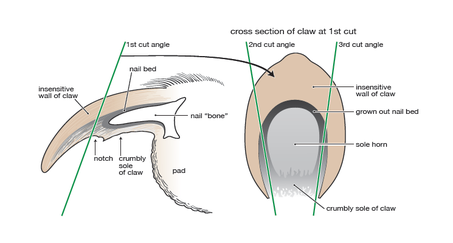
What’s inside your dog’s toenail? (image at left) On the left, the interior structures are shown, along with the suggested angle to remove the “roof” of the nail, while not harming the sensitive quick. On a black claw, the interface between sensitive and insensitive nail is usually chalky and white – very easy to discern. On the right is a close-up view of the inside of the nail. On cross section, the sensitive quick will look translucent and glossy, like living flesh. In untrimmed claws, there will often be a “notch” below the tip of the quick. It is usually safe to initiate your angled cut at the notch.
Some dogs act like cutting their nails is their worst nightmare. This may be a learned behavior from their painful, overstimulated toes, which will slowly dissipate along with the pain once the nails are short. Use all your best restraint and behavior modification tricks to get through the initial phase, whether your dog is a squirmer or a drama queen.
Start on the hind feet, because the nails tend to be a little shorter and less sensitive than the front. But remember you can’t make an accurate cut on a moving target so get help from your dog trainer or groomer if needed. Make nail trimming “quality time” you spend with your dog. Lots of kisses, lots of treats and a positive attitude go a long way. If you dread it, your dog will too, so learn how to be a good actor until you succeed in believing it can be a loving experience for you both. If your dog loses patience quickly, try cutting one nail a day. As long as you keep the order of toes consistent, this will be a good maintenance schedule, giving every toe a trim every 16 days.
Short toenails are critical to your dog’s health and soundness. Failure is not an option!
(Illustrations by Michael A Simmons MFA)
Some dogs act like cutting their nails is their worst nightmare. This may be a learned behavior from their painful, overstimulated toes, which will slowly dissipate along with the pain once the nails are short. Use all your best restraint and behavior modification tricks to get through the initial phase, whether your dog is a squirmer or a drama queen.
Start on the hind feet, because the nails tend to be a little shorter and less sensitive than the front. But remember you can’t make an accurate cut on a moving target so get help from your dog trainer or groomer if needed. Make nail trimming “quality time” you spend with your dog. Lots of kisses, lots of treats and a positive attitude go a long way. If you dread it, your dog will too, so learn how to be a good actor until you succeed in believing it can be a loving experience for you both. If your dog loses patience quickly, try cutting one nail a day. As long as you keep the order of toes consistent, this will be a good maintenance schedule, giving every toe a trim every 16 days.
Short toenails are critical to your dog’s health and soundness. Failure is not an option!
(Illustrations by Michael A Simmons MFA)
One of our most popular fund raisers is Spa Day. We hold Spa Days 4 or 5 times during the year at various locations. The most sought after service of that day is greyhound nail trimming. It seems that none of us want to cut our own greyhound's nails. Maybe out greyhounds are just too much into drama or maybe we just worry we will hurt them. But nail trimming is a significant health issue for your greyhound if you don't get them cut often! Read the following article on why nail trimming is important and just how to do it. .
This section includes short articles on topics on how to care for your greyhound. Many of the articles came from prior newsletters or were written to address problems or as answer specific questions as they arose. This section will be added to over time as issues come up and/or if new information becomes available. If you have a topic you would like addressed in this section contact us.
